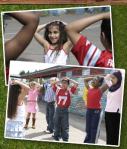On the weekend of 11-12th November 2023 Dieri families met in Broken Hill, New South Wales, for a workshop called Yarning about Language, to talk about Diyari language and to practice some words and expressions. This was the first time a language workshop had been organised in Broken Hill — it was arranged and paid for by the families themselves. Peter Austin (linguist) and Taryn Debney (archaeologist) were invited along to talk about their work, including the visit to Killalpaninna in December 2022, but the main focus was on language learning and use. Readers who are on Facebook can find out more on the https://www.facebook.com/dieri.language page.
The workshop was attended by about 60 enthusiastic participants over the two days, many of whom came on both days. They included elders from Port Augusta (South Australia) and Broken Hill, parents, teenagers, as well as children as young as seven. Everyone joined in the activities of learning words and expressions (such as parts of the body, and greetings), singing (especially mangathandra pilpiri pantya thina ‘head shoulders knees toes’), and playing lingo bingo, a game where players match picture cards with the Diyari word by listening to them said aloud. We concentrated on listening and saying skills, and did not worry about how to spell the words as the focus was on hearing and speaking the language, rather than reading and writing. Copies of the Diyari Reference Dictionary by Peter Austin were given to family groups so they can look up words and spelling themselves later — interested readers can download a PDF of the dictionary to their phone, iPad, or computer (or print it off) at http://www.peterkaustin.com/docs/Austin_2013_Diyari_Dictionary.pdf.
Everyone attending knew many of the words we practiced, including the younger children. When talking about parts of the body the children suggested thina puta ‘shoe’ (made up of thina ‘foot’ and puta ‘boot’, originally from English). When asked how they knew that word, they said their father always told them “don’t go out thina puta parlu“, that is, without any shoes on (the word parlu means ‘naked’). So families in Broken Hill are using Diyari language every day along with English.
The workshop was a great success and the two days were enjoyed by everyone who came along. In the final yarning sessions the Broken Hill families asked for more workshops in the future, especially trips to Killalpaninna where people can use the language on Dieri country.










